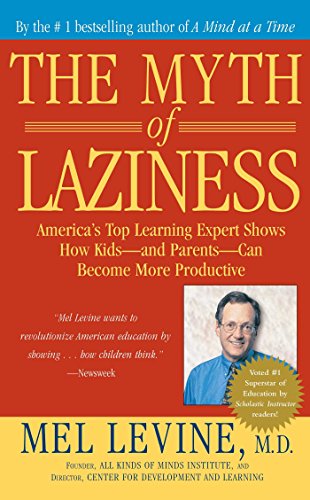The Myth of Laziness
Mel Levine
BOOK REVIEW

In a world where the pace of life often amplifies the pressures on our mental faculties, The Myth of Laziness by Mel Levine emerges as a beacon of understanding. This groundbreaking work, published in 2004, defies the conventional stigmas surrounding learning and behavior. It compels you to rethink the very essence of what we label as "laziness." Are we merely slothful, or is there a deeper, more complex interplay of neurological factors at play?
Levine, an esteemed pediatrician and educational specialist, dissects the intricacies of the human brain, shedding light on why some students struggle in traditional education systems. With a background rich in understanding cognitive development, his insights are not only thought-provoking; they are revolutionary. He argues that what society often misinterprets as laziness is frequently a manifestation of unnoticed learning differences. This book doesn't just criticize the educational establishments; it confronts the misconceptions we harbor about intelligence and effort.
One cannot truly grasp the impact of Levine's work without considering the sociocultural context of the early 2000s. As technology burgeoned and educational paradigms shifted, the pressures on students intensified. The No Child Left Behind Act was in full swing, emphasizing standardized testing and accountability. Yet, amidst this backdrop, Levine's work offers a clarion call for empathy and understanding. He dares to challenge the narrative that equates academic success with a singular type of intelligence-a narrative that continues to reverberate in classrooms today.
The Myth of Laziness doesn't shy away from controversy. Readers have expressed powerful, conflicting emotions after engaging with Levine's assertions. Some lauded his championing of neurodiverse learners, while others critiqued his departure from traditional pedagogical practices. A common thread among readers is the striking realization that their past struggles with focus and motivation might not be personal failures but indicators that the educational framework simply failed to recognize their unique learning profiles. Who among us has not felt time slip away in a classroom that simply fails to resonate with our individual ways of processing information? This book hits home.
Critics have argued against Levine's framing, claiming it absolves individuals from responsibility, suggesting that we must all strive to meet expectations. However, let's take a moment to consider the emotional weight of this dialogue. How often do people endure the crippling self-doubt that arises when they are unjustly categorized as lazy? Levine's work serves not to excuse but to illuminate, encouraging a shift in how we perceive and respond to perceived underachievement. It is a plea for deeper understanding-a call for educational reform that prioritizes empathy alongside accountability.
Each page of this provocative text resonates with potent questions designed to unravel ingrained biases. Have we constructed an educational Gauntlet that favors the quick and the easy, while those who dream differently are relegated to the sidelines? As you turn the pages, expect to be confronted with your own preconceptions. The journey through The Myth of Laziness is not just about comprehension but about instigating a shift in societal attitudes, awakening compassion toward those who struggle to keep pace.
Moreover, readers have shared personal anecdotes intertwined with Levine's theories, revealing how the book has acted as a catalyst for change-not just in educational approaches but in personal lives. Inspired by Levine, many have advocated for alternative learning strategies in schools, fighting for a system that recognizes the diverse ways in which individuals learn and thrive. This ripple effect underscores the book's significance, proving that it has profoundly influenced educators, parents, and students alike.
To walk away from The Myth of Laziness without acknowledging its implications is to ignore an opportunity for monumental societal growth. It's an earnest discussion about how we view human potential, each story shared by readers illuminating a path toward a more inclusive understanding of ability.
Allow yourself to dive into Mel Levine's compelling narrative, where the urgency of redefining "laziness" is not just a luxury but a necessity for creating a world where every mind has the opportunity to flourish. By engaging with this text, you will undoubtedly find yourself ensnared in a whirlwind of realizations, compelled to rethink not just the educational landscape but your own perceptions of effort, success, and the intricacies of the human mind. 🌟
📖 The Myth of Laziness
✍ by Mel Levine
🧾 288 pages
2004
#myth #laziness #levine #MelLevine